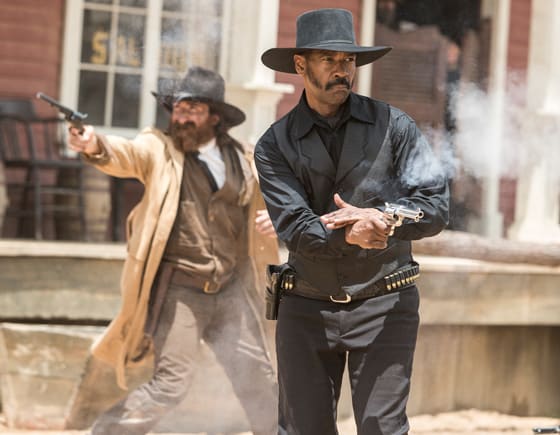Reboots get a bad rap, and for good reason: for the most part, they're unimaginative vehicles designed to milk more money out of titles film companies already own. Training Day director Antoine Fuqua's reimagining of John Sturges' classic western The Magnificent Seven (itself a remake of Akira Kurosawa's far superior 1954 film Seven Samurai) doesn't entirely flip the script, but its subtly progressive changes to the storyline, amped up action and immense star power make it worth a watch, especially after a summer filled with lacklustre popcorn flicks.
The stakes are higher this time around: Bartholomew Bogue (Peter Sarsgaard) is an egotistical baron looking to uproot the town of Rose Krick by any means necessary (read: violence) in order to help further his mining operations. One of the survivors, Emma Cullen (Haley Bennett), hires a bounty hunter by the name of Sam Chisolm (Denzel Washington) to help her community fight back against the greedy landowner and alleviate their hardship.
To do so, he assembles a crew of likeminded gunslingers: Josh Faraday (Chris Pratt), a card sharp who packs a mean pair of pistols; Goodnight Robicheaux (Ethan Hawke), a crooked ex-Confederate soldier with an accurate shot and his knife-wielding accomplice, Billy Rocks (South Korean cinema staple Byung-hun Lee); Vasquez (Manuel Garcia-Rulfo), a Mexican outlaw; Jack Horne (Vincent D'Onofrio), a spiritual and skilled tracker; and Red Harvest (Martin Sensmeier), a native warrior who was abandoned by his tribe. Once the team is assembled, there's only one thing left to do: train the villagers how to use firearms, set up explosives and prepare for war with Bogue and his band of mercenaries.
And what a bloody battle it is. People who have fond memories of seeing the original in theatres will likely be horrified by how violent Fuqua's update is, but behind all the bullets lies a powerful message that will likely hit home for Americans going into election season about not being pushed around by ideologues who see things as their way or the highway.
On the acting front, all the established actors — Washington, Hawke, Lee and D'Onofrio — steal the show here. Pratt has been famously quoted as saying that "As long as I keep getting cast, I don't care if it's typecast," and that's officially become a bit of a problem; he's the least believable as a southern gun-for-hire here and, although still charming on screen, drags down the film's more serious moments.
Still, watching Washington seek justice for the less fortunate is worth the price of admission alone, and although it's easy to see the ending a mile away, it, as well as the cast and crew's diversity, signals a strong change in Hollywood.
(Sony)The stakes are higher this time around: Bartholomew Bogue (Peter Sarsgaard) is an egotistical baron looking to uproot the town of Rose Krick by any means necessary (read: violence) in order to help further his mining operations. One of the survivors, Emma Cullen (Haley Bennett), hires a bounty hunter by the name of Sam Chisolm (Denzel Washington) to help her community fight back against the greedy landowner and alleviate their hardship.
To do so, he assembles a crew of likeminded gunslingers: Josh Faraday (Chris Pratt), a card sharp who packs a mean pair of pistols; Goodnight Robicheaux (Ethan Hawke), a crooked ex-Confederate soldier with an accurate shot and his knife-wielding accomplice, Billy Rocks (South Korean cinema staple Byung-hun Lee); Vasquez (Manuel Garcia-Rulfo), a Mexican outlaw; Jack Horne (Vincent D'Onofrio), a spiritual and skilled tracker; and Red Harvest (Martin Sensmeier), a native warrior who was abandoned by his tribe. Once the team is assembled, there's only one thing left to do: train the villagers how to use firearms, set up explosives and prepare for war with Bogue and his band of mercenaries.
And what a bloody battle it is. People who have fond memories of seeing the original in theatres will likely be horrified by how violent Fuqua's update is, but behind all the bullets lies a powerful message that will likely hit home for Americans going into election season about not being pushed around by ideologues who see things as their way or the highway.
On the acting front, all the established actors — Washington, Hawke, Lee and D'Onofrio — steal the show here. Pratt has been famously quoted as saying that "As long as I keep getting cast, I don't care if it's typecast," and that's officially become a bit of a problem; he's the least believable as a southern gun-for-hire here and, although still charming on screen, drags down the film's more serious moments.
Still, watching Washington seek justice for the less fortunate is worth the price of admission alone, and although it's easy to see the ending a mile away, it, as well as the cast and crew's diversity, signals a strong change in Hollywood.
